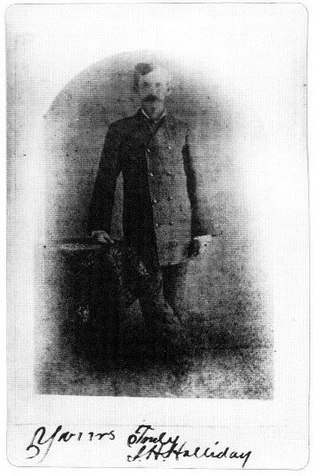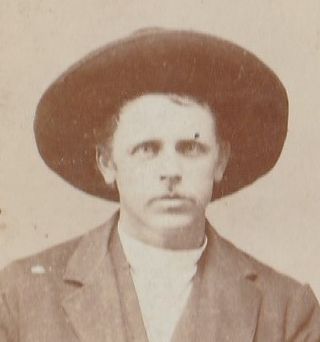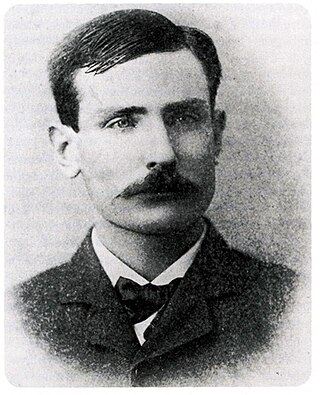
John HenryHolliday, better known as Doc Holliday, was an American dentist, gambler, and gunfighter who was a close friend and associate of lawman Wyatt Earp. Holliday is best known for his role in the events surrounding and his participation in the gunfight at the O.K. Corral in Tombstone, Arizona. He developed a reputation as having killed more than a dozen men in various altercations, but modern researchers have concluded that, contrary to popular myth-making, Holliday killed only one to three men. Holliday's colorful life and character have been depicted in many books and portrayed by well-known actors in numerous movies and television series.

Wyatt Berry Stapp Earp was an American lawman in the American West, including Dodge City, Deadwood, and Tombstone. Earp was involved in the gunfight at the O.K. Corral, during which lawmen killed three outlaw Cochise County Cowboys. While Wyatt is often depicted as the key figure in the shootout, his brother Virgil was both Deputy U.S. Marshal and Tombstone City Marshal that day and had considerably more experience in law enforcement as a sheriff, constable, and marshal than did Wyatt. Virgil made the decision to enforce a city ordinance prohibiting carrying weapons in town and to disarm the Cowboys. Wyatt was only a temporary assistant marshal to his brother.

Gunfighters, also called gunslingers or in the late 19th and early 20th century gunmen, were individuals in the American Old West who gained a reputation of being dangerous with a gun and participated in shootouts. Today, the term "gunslinger" is more or less used to denote someone who is quick on the draw with a handgun, but this can also refer to those armed with rifles and shotguns. The gunfighter is also one of the most popular characters in the Western genre and has appeared in associated films, television shows, video games, and literature.

Bartholemew William Barclay "Bat" Masterson was a U.S. Army scout, lawman, professional gambler, and journalist known for his exploits in the late 19th and early 20th-century American Old West. He was born to a working-class Irish family in Quebec, but he moved to the Western frontier as a young man and quickly distinguished himself as a buffalo hunter, civilian scout, and Indian fighter on the Great Plains. He later earned fame as a gunfighter and sheriff in Dodge City, Kansas, during which time he was involved in several notable shootouts.

David Allen Mather, also known by the nickname "Mysterious Dave," was an American lawman, gunfighter, and occasional criminal in the Old West. His taciturn personality may have earned him the nickname "Mysterious Dave". Mather served as a lawman in Dodge City, Kansas, and East Las Vegas, New Mexico Territory. He disappeared in 1885 and his precise fate is unknown.

Luke Lamar Short was an American Old West gunfighter, cowboy, U.S. Army scout, dispatch rider, gambler, boxing promoter, and saloon owner. He survived numerous gunfights, the most famous of which were against Charlie Storms in Tombstone, Arizona Territory, and against Jim Courtright in Fort Worth, Texas. Short had business interests in three of the best-known saloons in the Old West: the Oriental in Tombstone, the Long Branch Saloon in Dodge City, and the White Elephant in Fort Worth.

David Rudabaugh was a cowboy, outlaw and gunfighter in the American Old West. Modern writers often refer to him as "Dirty Dave" because of his alleged aversion to water, though no evidence has emerged to show that he was ever referred to as such in his own lifetime.

James Cooksey Earp was a lesser known older brother of Old West lawman Virgil Earp and lawman/gambler Wyatt Earp. Unlike his brothers, he was a saloon-keeper and was not present at the Gunfight at the O.K. Corral on October 26, 1881.

Charles E. Bassett was a lawman and saloon owner in the American Old West in Dodge City. He was one of the founders of the Long Branch Saloon in Dodge City, served as the first sheriff of Ford County, Kansas, as well as city marshal of Dodge City. His deputies included Wyatt Earp and Bat Masterson.

Edward John Masterson was a lawman and the oldest brother of the American West gunfighters Bat Masterson and James Masterson.

James Patrick Masterson, was a lawman of the American West and a younger brother of gunfighters and lawmen Bat Masterson and Ed Masterson.

The Long Branch Saloon was a well-known saloon in Dodge City, Kansas, from about 1874 to 1885. It had several owners, most notably Chalk Beeson and gunfighter Luke Short. The establishment provided gambling and live entertainment, including Beeson's five-person orchestra. It was the scene of several altercations, shoot-outs, gunfights, and standoffs often associated with cattle towns in the American wild west. Most famous was the 1879 Long Branch Saloon Gunfight, in which Frank Loving killed Levi Richardson.

Ben Thompson was a gunman, gambler, and sometimes lawman of the Old West. He was a contemporary of "Buffalo" Bill Cody, Bat Masterson, John Wesley Hardin, and "Wild Bill" Hickok, some of whom considered him a friend, others an enemy. Thompson fought for the Confederacy during the Civil War, and later for Emperor Maximilian in Mexico. After he was hired in 1881 as marshal in Austin, Texas, the crime rate reportedly dropped sharply. Thompson was murdered at the age of 40 in San Antonio, Texas, in the "Vaudeville Theater Ambush."
Frank Loving, sometimes called "Cockeyed" Frank Loving, was an Old West gambler and gunman. He was involved in two well-publicized shootouts of the day.

The Long Branch Saloon gunfight, on April 5, 1879, was an altercation that took place between Frank Loving and Levi Richardson at the Long Branch Saloon in Dodge City, Kansas. Both men were gamblers who frequented the saloon.
Abraham G. Graham, known by the alias "Shotgun" John Collins, was a little-known though well-associated gunfighter and outlaw of the American Old West.

Dora Hand, her stage name was Fannie Keenan,, was an American dance hall singer and actress in Dodge City, Kansas, who was mistakenly shot to death from ambush by a young unwanted suitor who was acquitted of criminal charges in the case. Hand was also linked romantically with James H. "Dog" Kelley, the mayor of Dodge City from 1867 to 1871.

Wild Bill Hickok is a 1923 American silent Western film directed by Clifford Smith and starring William S. Hart, Ethel Grey Terry, Kathleen O'Connor, James Farley, Jack Gardner, Carl Gerard, and William Dyer. It was written by William S. Hart and J.G. Hawks. The film was released on November 18, 1923, by Paramount Pictures. It was the first film to depict Wyatt Earp, although in a very brief role, and the only film made before he died in 1929 that included his character, until Law and Order was released in 1932.

James H. "Dog" Kelley was the Dodge City, Kansas, mayor from 1877 to 1881. As mayor Kelley worked with US Marshalls and sheriffs. As mayor Kelley worked with well known lawmen in the Old West. The lawmen included: Bat Masterson, James Masterson, Ed Masterson, Wyatt Earp and Morgan Earp. Kelley arrived in Dodge City with General George Custer in 1872. Kelley worked for Custer as his orderly and took care of Custer's horses and his pack of greyhounds. His friend and entertainer, Dora Hand, was killed on October 4, 1878, in his home while he was out of town. James H. Kelley was born on February 19, 1834, in Manchester, England. Kelley died in September 1912 and is buried at the Fort Dodge Cemetery.

















